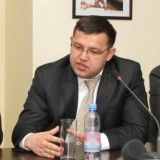 Olzhas KhudaibergenovIn a joint statement, the Government and National Bank of Kazakhstan indicated that tenge devaluation is not expected in 2015, said Chief Executive Officer of Kazakhstan’s Economists Association Olzhas Khudaibergenov in an exclusive interview with IA Strategy 2050.kz.
Olzhas KhudaibergenovIn a joint statement, the Government and National Bank of Kazakhstan indicated that tenge devaluation is not expected in 2015, said Chief Executive Officer of Kazakhstan’s Economists Association Olzhas Khudaibergenov in an exclusive interview with IA Strategy 2050.kz.
All state companies will be supporting this position and conducting a coordinated policy regarding management of currency positions, which is a very important step towards de-dollarisation and strengthening the national currency, astanatimes.com reports.
Standards for minimum reserve requirements will be raised in the banking sector, which is the second step toward de-dollarisation of the Kazakh economy.
In a third move, the Government and National Bank made a statement about the basic lines of economic policy for 2015, which specifies that indicating price in foreign currency will be prohibited.
In a fourth action, the maximum recommended interest rate for guaranteed bank deposits will be decreased from 4 percent to 3 percent in dollars and increased from 10.5 percent to 12 percent in tenge. Moreover, the Kazakhstan Deposit Insurance Fund will double the amount of coverage from 5 million to 10 million tenge (US$27,063 to US$54,127), including deposit percentage.
Khudaibergenov also believes that it is possible to make the tenge position more favourable for second-tier banks. The National Bank is not allowed to raise the standards for minimum reserve requirements on tenge liabilities and must charge an annual yield of 3 percent on amounts that are transferred to accounts in the bank.
“We aren’t going to close borders and devalue currency,” said First Deputy Prime Minister Bakytzhan Sagintaev at a Jan. 30 panel discussion in Almaty. He noted that the Nurly Zhol new economic programme will be additionally financed by up to 200 billion tenge (US$1.1 billion). Funding sources are determined and agreed upon by Kazakh President Nursultan Nazarbayev.
Sagintaev pointed out that Kazakhstan has to defend its own commodity producers under the conditions of the Eurasian Economic Union (EAEU). “The National Fund goes to the expense of 100 billion tenge (US$541.3 million) for business activity support. We have many offers to increase this amount up to 200 billion tenge (US$1.1 billion),” he said.
The government also takes measures to decrease the quantity of authorisation documents for small and medium-sized businesses. Sagintaev said that 123 authorisation documents were cancelled and on July 1, the list of necessary authorisation documents will include 350.
In January, the European Bank for Reconstruction and Development lowered its forecast for Kazakhstan’s gross domestic product growth this year setting its estimate at 1.5 percent. It amounted to 5.1 percent in September 2014. The reason was the fact that the state’s overall external income mostly comes from the oil sector, which in turn accounts for 40 percent of Kazakhstan’s gross domestic product.
High devaluation expectations are based on two factors: low oil prices and Russian ruble devaluation.
The average Brent oil price per barrel amounted to $99.45 in 2014. In 2015, the most upbeat forecasts target $70 a barrel, while the most downbeat forecasts target $40. OPEC the International Energy Agency state that the downward pressure on oil will continue in 2015 and 2016.
The top-priority goals of the financial system control policy in Kazakhstan in 2015 are enhancing the national currency role in the economy, tenge liquidity increases for banks to increase lending and restore the banking sector. The latter will be achieved by the decrease of distressed assets of banks. The registered capital of the troubled loan fund will be increased to 250 billion tenge (US$1.4 billion) and cooperation with banks will be improved.
Current reports indicate all these measures will be well balanced to save achieved positive results of Kazakh macroeconomic development and provide further stable economic growth. If the situation at external markets changes for the worse, the Government and National Bank will take additional measures to preserve social and economic stability in the state. Both the Government and the National Bank have calculated various scenarios that envision appropriate changes in fiscal and monetary policy and maintain that national currency devaluation is improbable.
 В Атырау -10
В Атырау -10